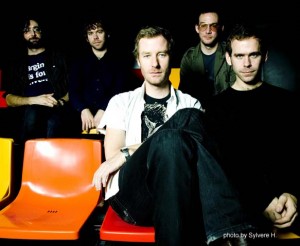Ellnora Guitar Festival review!
Krannert Center For The Performing Arts, Urbana
September 10-12, 2009

For its third biennial guitar festival, Krannert Center For the Performing Arts on the University Of Illinois campus has changed the name. The Festival formerly known as “Wall to Wall” is now called “Ellnora: The Guitar Festival.” With that name change came a subtle focus change.
The guitar’s rise to prominence that came about with the rise of rock ‘n’ roll has, somewhat perversely, also limited the public’s perception of its versatility. Unfairly — and not — the expectations anyone alive since 1950 brought to the first Wall To Wall guitar festival reflected that. Both curator David Spelman and Director of Kranner Center Mike Ross wrestled with those expectations over the first two festivals, experimenting with the mix of styles, the relative importance of rock and blues, and, most of all, the tension between the visceral and intellectual. Where “Wall 2 Wall Guitars” evokes the mental image of a line of (mostly rock) virtuosi vying for sonic prominence, amps on 11, “Ellnora” calls up a more sophisticated, discriminating examination of the six-string. That was just what Ross and Spelman created this time around.
Ellnora emphasized the basics: classical guitar with Bachfest and Brasil Guitar Duo; bluegrass with Jerry Douglass; blues with Keb’ Mo’ and Laurie Morvan; jazz with The Sisters Euclid and Jake Hertzog; roots from the Derek Trucks Band; singer/songwriters from Ani DiFranco, Richard Julian & Jim Campilongo, Natalia Zukerman, and Erin McKeown. Dan Zanes & Friends brought rock, kid version. Indie band The National and, earlier in the week, an evening with local guitarists and musicians put together by Cody Sokolski and backed by The Delta Kings were as close as this festival ever got to raucous rock. (Full disclosure: Cody Sokolski is my husband.)
There was some conceptual fare and it, too, was more tightly focused than in festivals past. Alex de Grassi scored the silent Japanese film A Story of Floating Weeds, which he then performed with the film. The Leni Stern Quartet did the same to the silent Chinese film, The Goddess. Both had limited success. De Grassi’s film was difficult to follow; Stern’s music seemed disconnected from it. Bill Frisell’s Disfarmer Project: Musical portrait From Heber Springs and The Long Count by Aaron and Bryce Dessner (The National) fused visuals and music. Both did well in using the two arts forms to add new dimensions to the other, but Frisell’s was by far the less compelling of the two. What started out strongly with lush, chiming music echoing Disfarmer’s gentle, black-and-white portraits of residents of small-town Arkansas taken during the Depression and World War II, soon grew stale.
All the performers shared a professionalism that made their performances reliable – and often reliably good. But transcendence was in short supply this year. Only The National, The Long Count, and the evening of local musicians that opened the festival provided any of the edginess or creative risk that turns a reliable event into an exciting, powerful one. Those three performances were the highlights of Ellnora.
The Long Count: Commissioned by the Brooklyn Academy Of Music, the brothers Dessner and visual artist Matthew Ritchie created an hour-long performance piece that integrates the Mayan myth of the fourth world and a baseball diamond to explore time and space. No, it’s not a clear concept — and it doesn’t get any more logical after seeing it. Utilizing a 12-piece orchestra (brass, strings, bass, drumset, and the Dessners on guitar) joined by singers Shara Worden (My Brightest Diamond), Matt Berninger (The National), and Kim and Kelley Deal (The Breeders), The Long Count is nonetheless a masterful piece. Carefully crafted, it soared, becoming intriguing, enthralling, and, finally, magical.
The National: Krannert Center is nationally known for its superb acoustics and they were perfect for the Leonard Cohen/ Roxy Music -descended chamber pop of The National. What can be buried in a miasma of blurry noise in a club became clear, rich, and meaty in a concert hall. Beginning their set somewhat intimidated by the formality of Krannert (“We’re excited. We’ve never had a ‘Turn Off Your Cell Phone’ announcement before”), the band settled in, took advantage and then took over. Yet the concert hall setting also revealed, starkly, how little (as in “no”) blues or R&B roots are in the music of this band. That’s not been a limiting move so far, but worth noting because it could be in the future – particularly given the skill with which the Dessners created The Long Count.
The Delta Kings with Special Guests: Introducing the Festival, the inclusion of an evening dedicated to the many (although certainly not all) guitarists in Champaign-Urbana turned out to be more than a savvy piece of community outreach. It was one of the best concerts of the festival. The Delta Kings, who are known for their roadhouse rock and superb rhythm section, served as the house band and Rena Day (Champaign) led a seven-piece choir. Together, they served as the backdrop for artists such as Angie Heaton, Kilborn Alley, Jack Brighton, Bruce “Bruiser” Rummenie, Eleni Moraites, David Howie, and Kathy Harden (among others). Deliberately, the styles ranged across the board. What unified the evening was the energy, passion, and, most of all, the sheer delight of the performers. As can happen, but doesn’t often, that delight transferred to the audience and back again, creating an evening as extraordinary as it was unexpected.
— M.S. Dodds
Category: Live Reviews, Weekly











